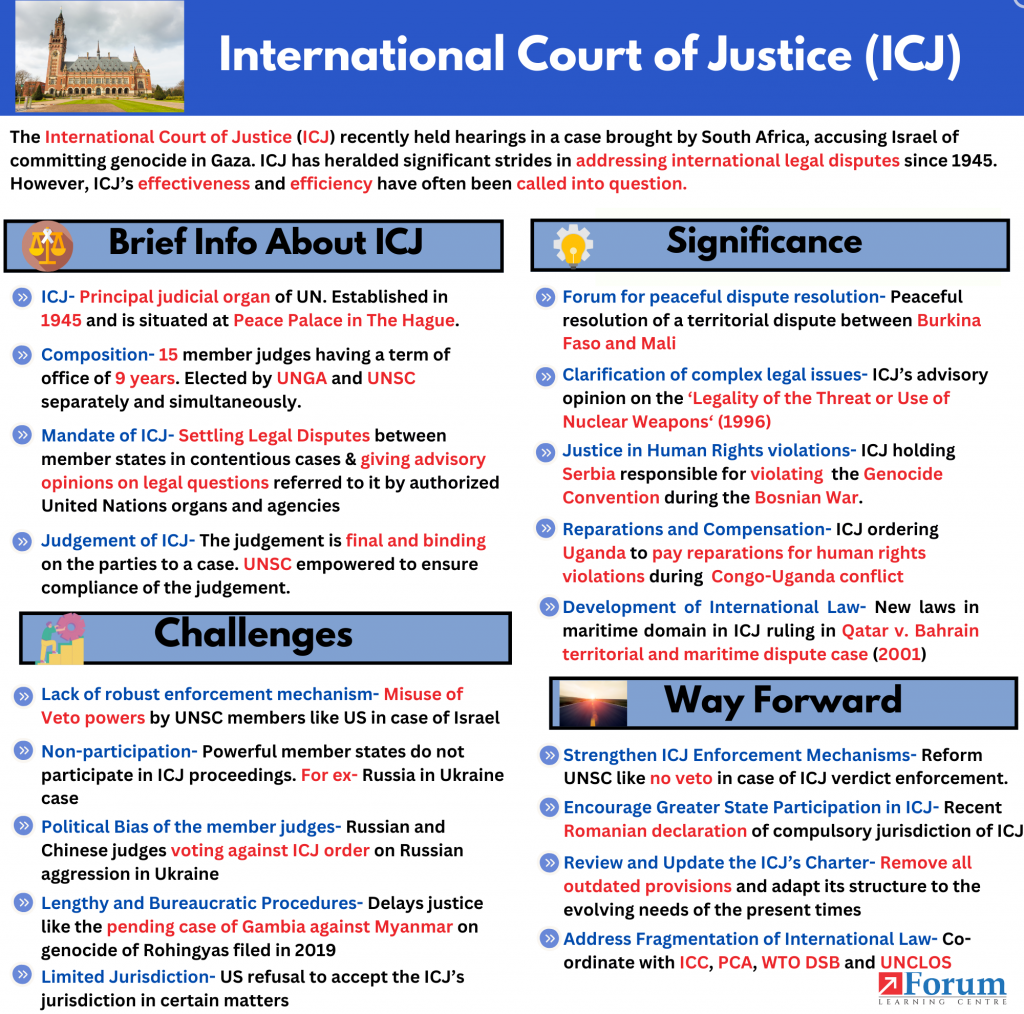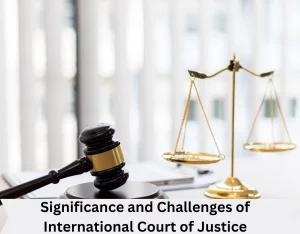ForumIAS announcing GS Foundation Program for UPSC CSE 2025-26 from 19 April. Click Here for more information.
The International Court of Justice (ICJ) recently held hearings in a case brought by South Africa, accusing Israel of committing genocide in Gaza. The International Court of Justice (ICJ) has heralded significant strides in addressing international legal disputes since its establishment in 1945. However, the effectiveness and efficiency of this esteemed institution have often been called into question.

What Is The Structure and Mandate of The International Court of Justice (ICJ)?
ICJ- The International Court of Justice (ICJ) is the principal judicial organ of the United Nations (UN). It was established in June 1945 by the Charter of the United Nations and began work in April 1946.
Seat of the ICJ- ICJ is situated at the Peace Palace in The Hague (Netherlands). Of the six principal organs of the United Nations, it is the only one not located in New York (United States of America).
Composition of the ICJ-
| Total Number of Judges | The ICJ is composed of 15 judges. The 15 judges of the Court are distributed in following regions-3 (Africa), 2 (Latin America and Caribbean), 3 (Asia), 5 (Western Europe and other states), 2 (Eastern Europe) |
| Tenure of Judges | These judges are elected for terms of office of nine years. In order to ensure a measure of continuity, one third of the Court is elected every three years. Judges are eligible for re-election. |
| Method of Election | The judges are elected by the United Nations General Assembly and the Security Council. These organs vote simultaneously but separately. In order to be elected, a candidate must receive an absolute majority of the votes in both bodies. |
| Independence | ICJ is not composed of representatives of governments, unlike other organs of international organizations. Judges make solemn declaration in open court that they will exercise their powers impartially and conscientiously. No Member of the Court can be dismissed unless, in the unanimous opinion of the other Members, he/she no longer fulfils the required conditions. (No ICJ member judge has been dismissed till date) |
| Administrative Organ | ICJ is assisted by a Registry which is its administrative organ. Its official languages are English and French. |
Role and Mandate of ICJ-
ICJ acts as a world court with two fold jurisdiction.
| Settling Legal Disputes | To settle legal disputes submitted to it by States in contentious cases like settling disputes between countries and determining “state responsibility” for crimes committed in violation of international law. Only States which are members of the United Nations and which have become parties to the Statute of the Court or which have accepted its jurisdiction under certain conditions, are parties to contentious cases. |
| Giving Advisory Opinions | To give advisory opinions on legal questions referred to it by authorized United Nations organs and specialized agencies. |
Judgement of ICJ- The judgment is final, binding on the parties to a case and without appeal (At the most it is subjected to interpretation or revision upon the discovery of a new fact).
If a state fails to perform the obligations incumbent upon it under a judgement, the other state can bring the matter before the Security Council. The UN Security Council is empowered to recommend or decide upon measures to be taken to give effect to the judgment.
Importance of the International Court of Justice
The International Court of Justice (ICJ) holds significant importance in the realm of international law and global governance.
1. Forum for peaceful dispute resolution- Countries bring their legal grievances before the court, and its decisions are binding on the parties involved. For Ex- Nicaragua v. United States case (1986), ICJ held US responsible for violation of International law, for supporting armed activities against Nicaragua. Burkina Faso and Republic of Mali Frontier Dispute Case (1986), ICJ facilitated the peaceful resolution of a territorial dispute between Burkina Faso and Mali.
2. Clarification of complex legal issues- Even though ICJ’s advisory opinions are non-binding, they carry significant weight in clarifying legal issues. For Ex- The ICJ’s advisory opinion on the ‘Legality of the Threat or Use of Nuclear Weapons‘ (1996) addressed the legality of nuclear weapons under international law.
3. Advisory Role in Diplomacy- The ICJ’s advisory opinions also support diplomatic efforts and facilitate resolution of contentious issues between states. For Ex- South Africa’s case against Israel (2023) for genocide in Gaza, could lead to an advisory opinion and influence diplomatic efforts in the Israel-Palestine conflict.
4. Increased adjuciation Human Rights violation and Genocide Cases- ICJ has contributed to the development and enforcement of international human rights standards. For Ex- In Bosnia and Herzegovina v. Serbia and Montenegro case (2007), the ICJ ruled that Serbia had violated the Genocide Convention during the Bosnian War.
5. Reparations and Compensation- The ICJ has the authority to order reparations and compensation for damages caused by one state to another. This has contributed to accountability for wrongful actions. Major rulings on reparations have also been adhered to by the concerned parties. For Ex- In Democratic Republic of the Congo v. Uganda case (2005), ICJ ordered Uganda to pay $325 million reparations for human rights violations and damages during the Congo-Uganda conflict. This order was complied by Uganda.
6. Development of International Law- The ICJ’s decisions and interpretations of international law have contributed to the development and clarification of legal principles and has set precedents for future cases. For Ex- In Qatar v. Bahrain territorial and maritime dispute case (2001), ICJ’s decisions have influenced the understanding and development of international law in these domains.
7. Enhanced participation of states under its framework- ICJ has been successful in furthering the participation of states that have not accepted its compulsory jurisdiction, by invoking its authority through dispute settlement clauses or special agreements. For Ex- Recent Romanian advancement of a declaration in support of the court’s jurisdiction has been supported by more than 30 Countries.
Challenges and Limitations To The ICJ
The International Court of Justice (ICJ) faces several challenges that impact its effectiveness and the implementation of its decisions.
1. Lack of dedicated and robust enforcement mechanism- The UN Charter authorises the UNSC to enforce the court’s decisions. However, its compliance and enforcement is often at the mercy of the power politics of the permanent members of the Security Council. For Ex- The enforcement of any adverse ruling against Israel is likely to be vetoed by its strongest ally, the U.S.
2. Non-participation of powerful member states in ICJ proceedings- Big power players have often refused to participate in the ICJ proceedings itself. For Ex- Russia’s refusal to participate in ICJ proceedings in the Ukraine vs Russia case (2022). U.S. refusal to submit to the ICJ jurisdiction in the famous Nicaragua vs the U.S. case (1986).
3. Political Bias of the member judges- The impartiality of ICJ judges have been compromised by political considerations. Member judges have sometimes aligned their decisions with the interests of their home countries. For Ex- Judges from Russia and China voting against the ICJ decision ordering Russia to halt military operations in Ukraine In 2022, revealing potential political influences.
4. Lengthy and Bureaucratic Procedures- The ICJ is marred by lengthy and bureaucratic process results in inordinate delays in delivery of Justice. For Ex- The 2019 case instituted by Gambia against Myanmar for its military crackdown on Rohingya refugees is still in trial. This is delaying the justice for Rohingya refugees.
5. Limited Jurisdiction- The ICJ’s jurisdiction is limited to cases where states voluntarily submit to its authority. Some states may not accept the compulsory jurisdiction of the court, reducing its scope. For Ex- US refusal to accept the ICJ’s jurisdiction in certain matters.
6. Potential for Fragmentation of International Law- The existence of multiple international courts and tribunals has raised concerns about potential contradictions in rulings. This can lead to uncertainty and fragmentation of international law. For Ex- The coexistence of the ICJ with other judicial bodies, such as the International Criminal Court (ICC) and Permanent Court of Arbitration (PCA) has resulted in varied interpretations of legal principles.
| Read More- Three major Judicial organizations in the world |
What Should Be The Way Forward To Reform The ICJ?
1. Strengthen ICJ Judgement Enforcement Mechanisms- It can be done by reforming the UN Security Council like increase in permanent membership, no veto in ICJ decisions. This will help in reducing the impact of political considerations on enforcement.
2. Explore Alternative Dispute Resolution (ADR) Methods- The ICJ can explore the use of alternative dispute resolution methods, such as mediation or arbitration, in certain cases to expedite resolutions and promote amicable settlements.
3. Promotion of Impartiality and Independence of Members- ICJ must promote transparency in the selection process. It must also encourage the judges to adhere strictly to the principles of the court rather than aligning with the political interests of their home countries. For Ex- India’s appointee to the ICJ, Justice Dalveer Bhandari’s voted in favour of provisional measures against Russia which was in conflict with India’s official stance at the UN (India had abstained from voting on all key resolutions pertaining to the Ukraine-Russia conflict)
4. Address Fragmentation of International Law- Efforts should be made to coordinate and harmonize the decisions of various international courts and tribunals like ICC, PCA, to avoid contradictions and inconsistencies in international law.
5. Enhancement of Procedural Efficiency- The ICJ must explore ways to streamline its procedures and reduce the time taken for cases to reach a final judgment.
6. Encourage Greater State Participation in ICJ- Diplomatic efforts could be made to encourage more states to accept the compulsory jurisdiction of the ICJ. For Ex- The recent Romanian declaration of acceptance of compulsory jurisdiction which was signed by 30 countries.
7. Improve Accessibility of developing Countries in ICJ- Capacity-building programs, legal assistance and financial support must be extended to developing countries to ensure their effective participation in the court’s proceedings.
8. Review and Update the ICJ’s Charter- A comprehensive review of the ICJ’s founding charter must be undertaken to remove any outdated provisions and adapt its structure to the evolving needs of the international community.
ICJ must be strengthened so that countries can resort to a peaceful method instead of attacking each other to settle the dispute.
| Read More- The Hindu UPSC Syllabus- GS II- International Organisations, their structure and Mandate |





